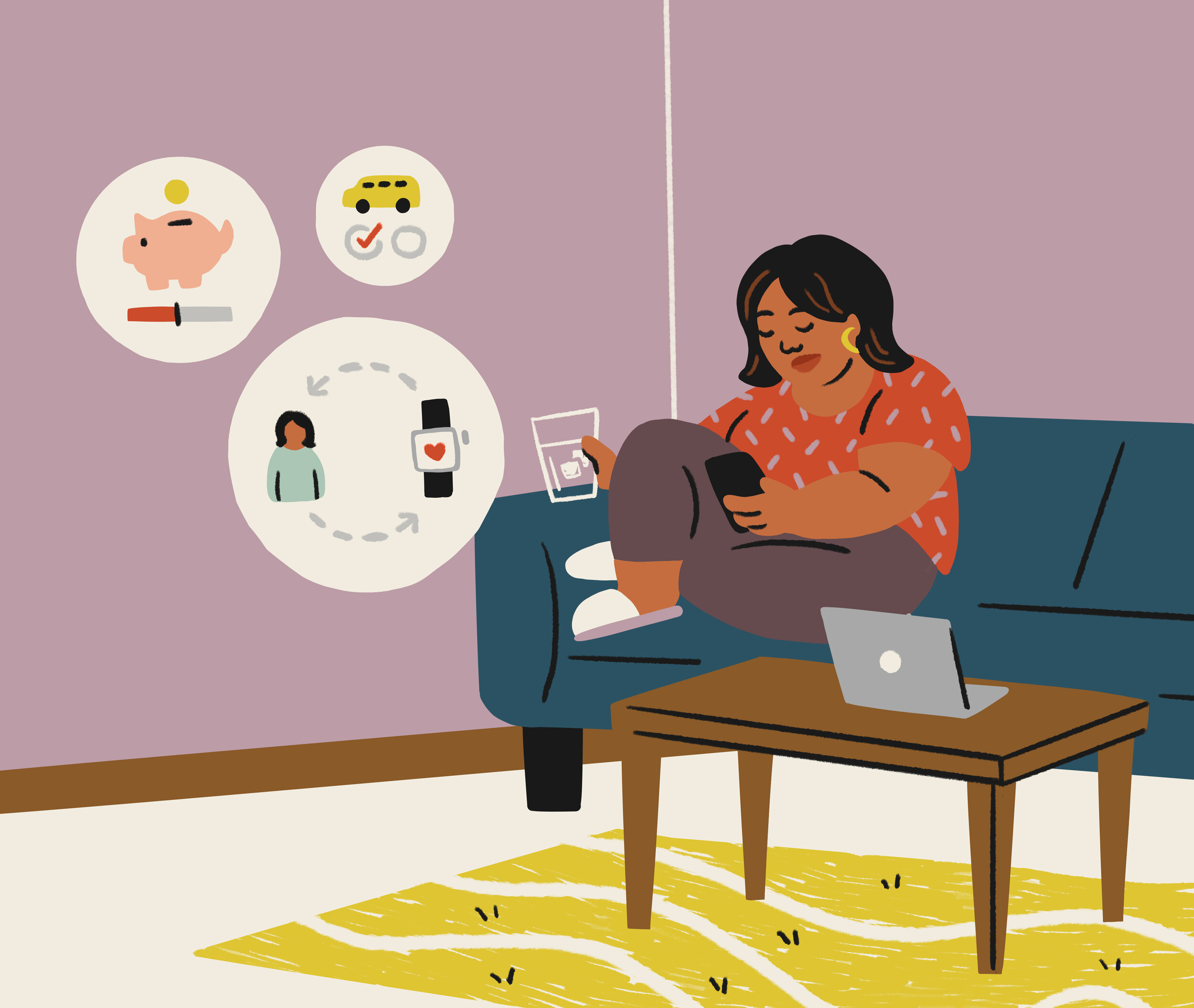
Pursuing health equity in obesity management
Engaging people with obesity and subject matter experts informed digital health opportunities through an equity lens.
A pharmaceutical company was accustomed to thinking about people with diseases as consumers of the drugs they sell.
When their nascent digital health team began exploring opportunities to address obesity—a new disease area for the company —a narrow focus on medication and clinical experiences was inadequate because of the extent to which lifestyle, behavior, and broader societal issues impacts a person’s relationship with weight and weight management.
The client needed a holistic understanding of what it’s like living with and managing obesity as well as the systemic considerations that factor into an individual’s health outcomes—insight that would inform their digital health strategy as well as broader efforts to address obesity.
Role: Project lead; team of 4
Duration: 12 weeks
Output:
Future state scenarios reflecting key opportunity areas and supporting insights
Framework for sustainable behavior change
As project lead, I worked with the client’s digital health team to...
Establish a human-centered understanding of people who live with obesity
Describe opportunities for how our client could help people with obesity have better healthcare experiences and outcomes, in particular (but not exclusively) via digital health interventions
Create future-state scenarios that would help the digital health team align and excite internal stakeholders (not only regarding the opportunities, but the holistic process of inquiry that led to them)
Approach
Primary research
Engaging people with obesity and subject matter experts
Desk research
Examining competitive offerings and cultural trends
Analysis and synthesis
To make meaning out of and structure insights from research
Opportunity framing
Framing opportunities and human-centered narratives to help the client socialize
We engaged people with obesity, subject matter experts, and undertook secondary research to gain a multi-faceted understanding of a complex space.
Conversations with people with obesity provided a human-centered perspective (image above).
Engaging subject matter experts ranging from weight clinic leaders to sociologists provided insight into the systemic and societal aspects of managing obesity.
Secondary research provided insight into existing weight management solutions and competitor activities.

“When I was younger, I thought being healthy was this super exaggerated thing, like someone completely ripped and super athletic and built, but growing up I realized those were outliers and that being healthy came down more to how I’m feeling rather than just how exactly I look.”
–“Michael”
We organized our research insights into a framework describing sustainable behavior change and the foundation that enables it.
The most successful weight management programs foster sustainable behavior change that is compatible with one’s life and culture, but building and sustaining new habits that lead to sustained weight loss is difficult or impossible without the right knowledge, mindset, and material capacity to make change happen.
Insights from primary research with subject matter experts and PwO-participants were embodied in this framework for sustainable behavior change. This framework helped the client team think beyond the “obvious” digital health opportunities—mimicking popular weight loss apps and providing medication companion apps—and consider how they might enable access to or coordinate care for people with obesity across these foundational needs.

“We're at a moment right now where there's a critical mass of people who are aware that the discourse surrounding fatness that we've long accepted really is baseless.
And we can think about a new way of allowing people to have a positive relationship to their bodies and to cultivate health within themself and their communities that does not rely on fat stigma.”
–Sabrina Strings, author of “Fearing The Black Body: The Racial Origins Of Fat Phobia”
Our collaborative process inspired our clients to double down on health equity.
Health equity was not originally the focus of our program, but having involved the client team throughout our process, they were inspired by early findings regarding issues such as the social determinants of health and their impact on obesity, increasingly vocal critiques of how the medical community frames obesity, and the barriers to accessing care. We expanded our research beyond the scope of strictly digital health opportunities to further explore societal and systemic issues around equity.
Embracing a weight-neutral approach to care.
An intersection of social movements have critiqued the medical establishment for body shaming and promoting weight loss at the cost of one’s mental health. The status quo of a “weight normative approach” where weight loss is the sole focus is being challenged by that of a “weight neutral approach” in which being of healthy mind and body is the goal.
Embracing a weight-neutral approach could reach people who have had traumatizing experiences with and are generally distrustful of the medical community.
Providing culturally-tailored solutions.
Everything from BMI calculations to dietary recommendations in the United States are often centered around a white American culture.
We framed for the client an opportunity to improve health equity by promoting lifestyle changes that are culturally tailored and flexible to fit within a patient’s culture and means.
Helping people connect with the care they need.
Primary care providers often lack the time, expertise, and compassion to properly address weight with their patients, and the personalized care provided by specialists can be out of reach (financially or otherwise). Barriers to HCP-assisted weight management can make it one of the last things people try.
Our understanding of these barriers highlighted opportunities across a range of interventions—from clinician decision support to directly addressing the social determinants of health.








